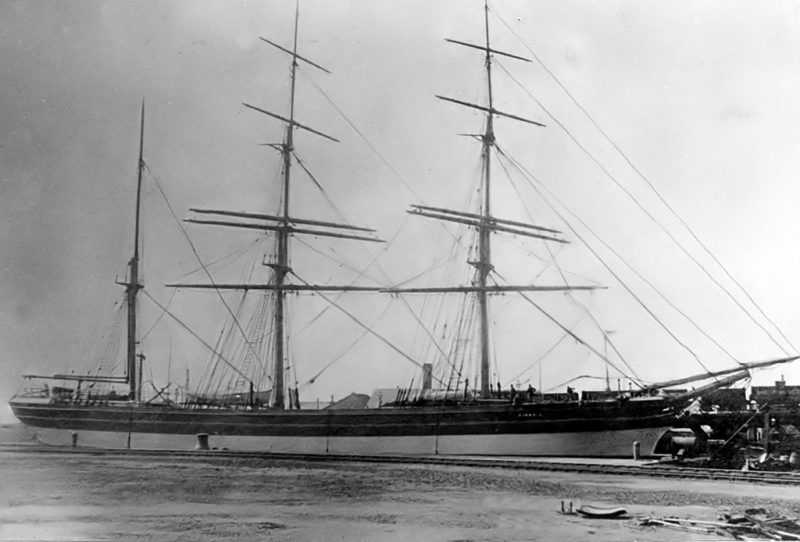
The steamer Walmer Castle of 2,446 grt, completed in 1872 by the Barclay, Curle yard on the Clyde, was the first Castle Line steamer to arrive at Cape Town on 4th October 1872. She had sailed from London with a call at Dartmouth to drop the Channel pilot, and a further call at Bordeaux. The narrow inlet and wooden slopes of the river Dart provided good vantage points for early photographs of Castle Line steamers. The Union-Castle Mail Steamship Co. Ltd. was registered on 8th March 1900 by the merger of Union Line and Castle Line. Southampton was the departure port on the express passenger service to Cape Town, whereas London was the departure port for the Round Africa via East Africa passenger and cargo service. Cargo only vessels and reefers on the East Africa service also called to load at other East Coast of England ports as well as Continental ports.
Durban Castle and Pretoria Castle, later Warwick Castle, were the last of eleven new liners, cargo ships and reefers totalling 190,000 grt in the late pre-war years to enter service for Union-Castle Line, with their lavender grey hulls and vermilion red funnels with a black top. This was one of the biggest building programmes ever begun by a British liner company. The orders for these two big liners were placed with the Belfast yard of Harland & Wolff Ltd., and they were to be closely modelled and enlarged versions of Dunnottar Castle and Dunvegan Castle of 1936 with more enclosed superstructure, and were powered by twin eight cylinder Harland-B&W oil engines of 17,000 bhp to give a service speed of 18.5 knots on an oil fuel consumption of 80 tonnes per day.
The two new liners, Yard numbers 987 and 1006, were to be 34 feet longer and nearly five feet wider on dimensions of overall length of 594.7 feet, length between perpendiculars of 560.0 feet, a moulded beam of 76.4 feet, and a moulded depth of 39.5 feet. They were designed for the Round Africa service, however both Durban Castle and Warwick Castle served for three years from 1947 to 1950 on the passenger and mail service from Southampton to Cape Town via Las Palmas in the Canary Islands, that had been restarted by the refitted Capetown Castle and Stirling Castle, and while waiting for their other bigger consorts to complete their post-war refitting.
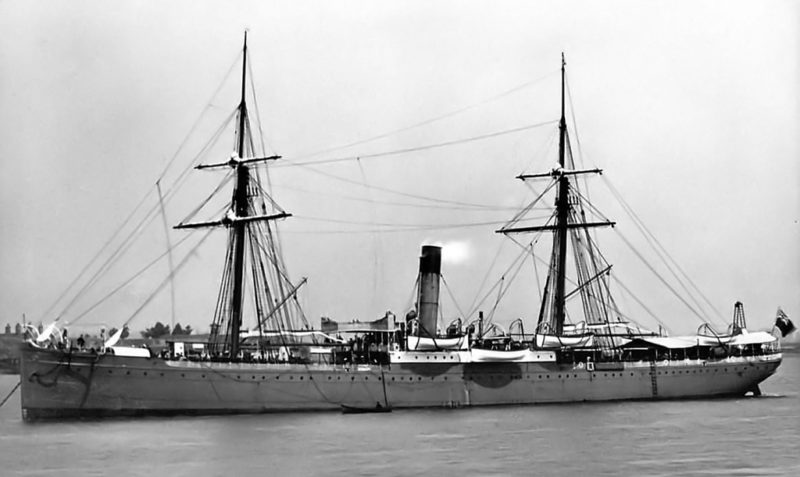
DESIGN and SPECIFICATION
The design of this pair of sisters was characterised by pleasing and graceful lines, curved stem, a cruiser spoon stern, extensive well rounded superstructure and navigating bridge, two masts, and a short, raked, pear shaped motorship funnel. When seen from the air, there was no mistaking the graceful lines and striking modern profile of these new Union-Castle Line ships. A similar layout of Dunnottar Castle of 1936 was retained, with a total of fourteen lifeboats on the top of the engineers’ house and on the navigating bridge Boat Deck. The hull was subdivided into ten watertight compartments by nine watertight bulkheads, all extended to Upper Deck level. The necessary openings in the bulkheads were fitted with electrically operated watertight doors controlled from the Navigating Bridge together with local control. The bridge bulkhead indicator showed the open or closed status of the watertight doors.
The continuous double bottom was arranged for the carriage of fresh water, water ballast, and oil fuel, the fore peak for fresh water or ballast, and the aft peak for water ballast. Deep fresh water tanks were also provided at the sides of the shaft tunnel aft, and deep oil fuel tanks were fitted across the vessel forward of the machinery space. A total of 3,100 tons of water ballast and 2,170 tons of oil fuel was carried in all tanks. There were three continuous steel decks and one partial steel deck forward and aft of the engine room in their hulls formed by 84 frames, double bottoms, inner bottom plating, and internal beams, girders and brackets. These decks were the Lower Deck, Main Deck, Upper Deck ‘A’, Shade Deck ‘B’ as the uppermost of the continuous decks, Bridge Deck ‘C’, Promenade Deck ‘D’ and Boat Deck ‘E’. The fo’c’stle was of length 110 feet, and the Bridge Deck was of 283 feet in length. They had accommodation for 220 First Class passengers, and 335 in Tourist Class. The rudder and steering gear were controlled by automatic steering control in conjunction with a gyro compass.
The new design was to the highest class of Lloyd’s Register of Shipping as well as the statutory requirements of the Ministry of Transport. They were designed with five decks that passengers could use:-
‘E’ Deck-Boat Deck for open spaces for sunbathing and games
‘D’ Deck-Promenade Deck for most of the public rooms
‘C’ Deck-Bridge Deck for staterooms
‘B’ Deck-Shade Deck for staterooms
‘A’ Deck-Upper Deck for staterooms
Provision was also made for the carriage of a considerable amount of general cargo and refrigerated cargo to give a deadweight of 10,802 tons on a gross tonnage measured at 17,392. General cargo was carried in the holds and refrigerated cargo in the ‘tween decks. First Class passengers numbered 220, and Tourist Class passengers at 335, with a crew of three hundred to give a grand total of 885 persons onboard when fully booked. The five holds and seven hatches, two forward and three aft, were served by fourteen derricks including a 30 tonne heavy lift derrick at number two hold, and were powered by twelve winches. The lower holds were designed for general cargo, and the ‘tween deck spaces were insulated for the carriage of citrus and deciduous fruits. A few of the insulated compartments were refrigerated for the carriage of frozen meat and fish. A total of 462,000 cubic feet of cargo was carried, general cargo and refrigerated cargo.
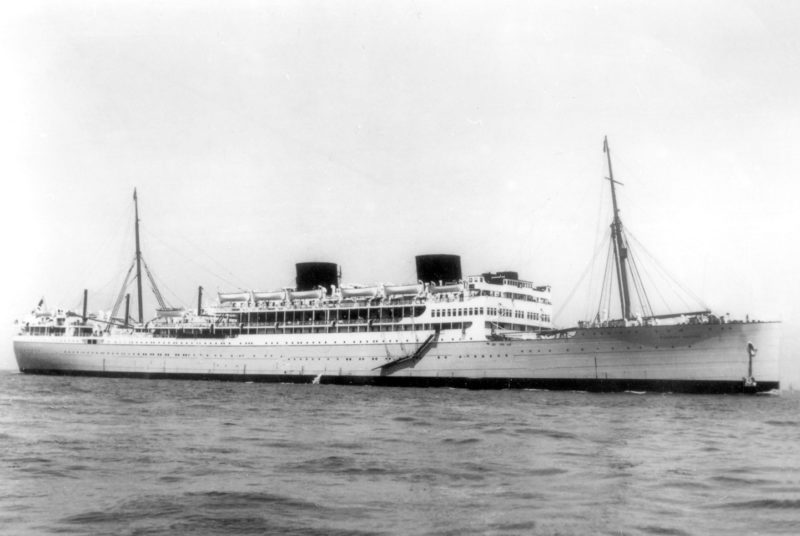
Fire fighting equipment was comprehensive with passive defence provided by fire resistant bulkheads, together with fire fighting appliances including sprinkler systems for the cargo holds supplied by the Walter Kidde Company of Middlesex. The accommodation was protected by the Grinnel sprinkler system supplied by Mather & Platt Ltd. J. & E. Hall Ltd. of Dartford supplied the refrigeration plant of the ‘tween deck spaces, storerooms and the air cooling plant. A separate installation was provided for the special cargoes in the low temperature range of cargo compartments. The circulation of cold air was monitored by electrical thermometers giving a reading of the temperature in each of the spaces and conveniently grouped together for refrigerated cargo. The galley equipment consisted of electric ranges, grills, bakery ovens, hot presses, fish fryers, hot plates and a variety of machines for the preparation of food. The copper pans were lined with nickel to give a high thermal conductivity of copper and the acid resisting properties of nickel. A large, well equipped laundry was needed to cope with the huge turnover of sheets and linen.
The Navigating Bridge was well equipped with the latest of equipment including radar, echo sounders, Marconi transmitters and receivers, electrical direction finders, range finders, navigation lights indicator, rudder indicator, helm indicator, engine revolutions indicator, two Kent clear view screens, and Siemens electric engine telegraphs. Public address systems and intercom systems for the chief officers and personnel were also provided. A very complete broadcasting, gramophone and band repeater system was installed. The orchestra in the First Class Dining Room or Lounge could be heard in any of the other public rooms and promenades throughout the ship. An electric lift was installed for conveying passengers to the various decks, while another lift carried the engineers from the starting platform in the engine room to their own quarters. A food hoist was also installed to carry hot food quickly to the Dining Rooms.
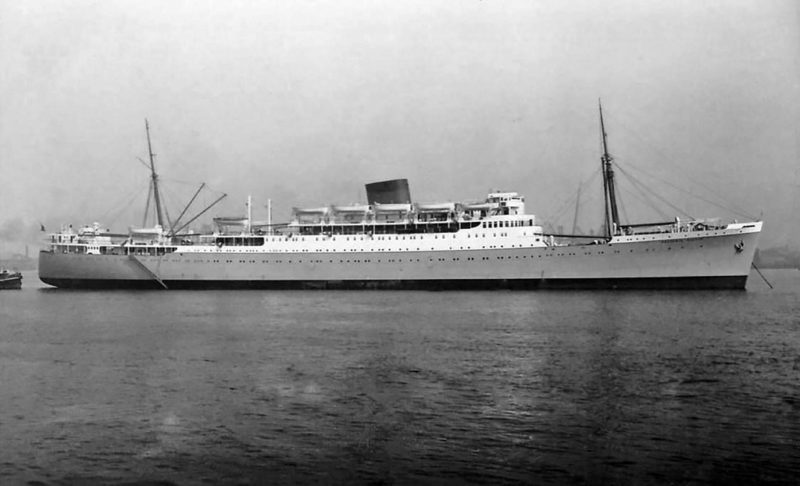
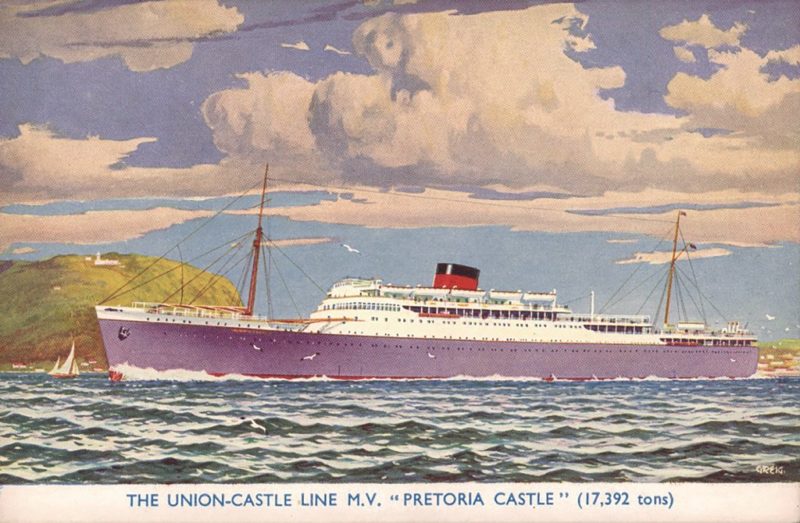
THE MAIN PROPELLING MACHINERY
The twin main diesel engines were the well-known Harland-B&W double acting, two stroke cycle, airless injection type, each having eight cylinders with a bore of 620 mm and a stroke of 1,400 mm. The design embodied an eccentric drive for the exhaust piston valves, uniflow scavenge system and tuned exhaust pipe system. Two rotary blowers of the positive displacement type were fitted at the back of each engine to supply the scavenge air. Spring couplings were arranged in the rotor drive to ensure smooth motion of the blower motors under all conditions of the working of the engines. Suction air silencers of the special acoustic interference type were fitted to the blowers to ensure noiseless inlet of the air.
The pistons were oil cooled, the cooling oil being conveyed to the piston through the annular space between the piston and the surrounding sleeve, and returned through the hole bored up the middle of the piston rod. The engine cylinder covers and jackets were cooled by fresh water, which circulated in a closed system, and which was cooled in a fresh water cooler. A thrust block of Harland-B&W type was incorporated with each engine bedplate at the after end, and was oil cooled from the main forced lubrication system.
Electrical power for the liners at sea and in port was provided by four 450 kilowatt diesel-driven generators installed in a separate engine compartment. These generators were of the Harland-B & W single acting cycle, poppet valve type, each having six cylinders. In the engine casing at Bridge Deck level were placed two Clarkson waste heat boilers, which utilised heat from the main engine exhaust gases when at sea. One of these was arranged for alternative oil firing, and there was also a Cochran oil fired boiler.
For ease of overhaul, a travelling crane was arranged over each main engine, with a lifting block for lighter loads at the fore and after ends of the engine room. A workshop was available on the port side of main deck level, and was equipped with an electric lathe, drilling machines and other tools, while the engineers had a store on the starboard side at the same level. Monitor alarms by Monitor Patent Safety Ltd. of Wallsend gave warnings of insufficient flow or loss of pressure by means of indicator lamps and loud horns in the fresh and salt water cooling and lubricating oil systems. There were no fewer than twenty pumps in the engine room for the fresh water, salt water, sanitary, sprinkler, lubricating oil, bilge, ballast and boiler feed uses.
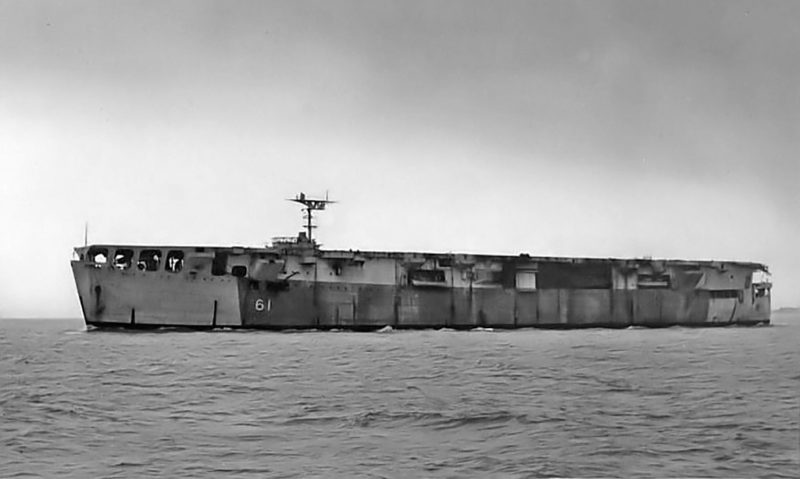
FIRST CLASS ACCOMMODATION
Union-Castle Line liners of most of the inter-war period, despite the modern advances of diesel-powered machinery, still had their public rooms based on Edwardian era lines and décor. First Class passengers had extensive open spaces on ‘E’ Deck for games, sunbathing or relaxation, and on ‘D’ Promenade Deck for sheltered walking, deck chair sun bathing, dancing and other pleasure pursuits. All First Class staterooms were one or two berth rooms with also a few three berth rooms, and all had washbasins with hot and cold running water, and ventilation by Thermotank Ltd. to vary the air supply of each stateroom under the control of and to the requirement of the passengers. Electrical heaters were also provided to boost the cabin temperature if required, while most of the public rooms were fully air-conditioned and heated by separate systems. Cane chairs were provided, and light coloured wooden dressing tables with sets of three drawers and a mirror above had fresh flowers when passengers came onboard.
The public rooms were ingeniously lit by indirect illumination in the same manner that was applied to those of the express liner Cape Town Castle of 1938. A clear, soft light was obtained to suit the relaxed manner that evening social meetings required, and also showed off the beautiful and skilful decoration of the public rooms, inlaid with exquisite South African and West African veneers and woods. The First Class public rooms comprised:-
First Class Lounge was at the forward end of Promenade Deck ‘D’ and was a large room with windows on three sides. The design was stately and dignified in a pleasant scheme of polished hardwood veneers and painted wall surfaces, with wide bay windows on the port and starboard sides, and French windows opening on to Promenade Deck at the forward end. The floor was of rubber in large panels of cool blue marble pattern, with a wide border in contrasting colours. Several fine rugs added to this effect, and the number of easy chairs and sofas gave ample provision for the comfort of passengers.
First Class Domed Dining Room was down on Upper Deck ‘A’ and sat 220 persons at tables arranged in fours and painted in warm colours, relieved with polished walnut surrounds to the windows and panels of Pacific myrtle at the forward and after ends. The centre of the room was two decks high, designed on simple modern lines with concealed lightning and large mirrors on the sides, giving a very spacious effect. The musicians’ gallery had a graceful bronze open balustrade overlooking the room at the forward end, while at the after end there was an arch into the First Class Entrance, from which a fine view of the room could be had. The chairs were walnut, upholstered in blue, and this colour was carried on in the design of the rubber floor in large panels, with light beige as a relief. There was a lift from the room to the First Class Lounge on Promenade Deck.
First Class Long Gallery and Library. The Long Gallery connected the forward public rooms with the Smoking Room aft, and was of simple design with walls lined with silk material on a light ground. At intervals, wide pilasters broke the walls into panels, and the centre one on the inboard side was occupied by the large decorative plaster panel presented by the City of Durban. The blue rubber flooring followed the decorative theme of the room. The Library adjoining the Lounge had walls painted to harmonise with it. On the inboard side was a large bookcase, the lower part of okoume wood, and the upper part in matzo birch veneer, as were the window linings.
First Class Smoking Room was modern in decorative treatment, with the walls lined with limed oak and English brown oak in broad panels. At the forward end was a broad recess, housing a fine painting of Durban with good lighting around it concealed in the panelling. The Verandah Café was at the aft end of the room and was treated with South African Dutch plaster, with a balustrade following the lines of a ‘stoep’ or ‘front porch’ on a South African farm.
First Class Children’s Room on Bridge deck was decorated in a bright coloured manner with furniture suitably designed for children, and to the aft of this room was an enclosed space closed by a hinged glazed teak screen to act as an open air playground. There was a tiled open air swimming pool aft on Promenade Deck with ample open deck space for sunbathing. The Shop on Shade Deck served both First Class and Tourist Class passengers, with the adjoining hairdressing salon. The Purser’s Office was situated at the forward end of Bridge Deck, facing the main First Class stairway. The entrance to this deck was in weathered elm, with a feature of a glazed partition enclosing the stairway, and made of special glass with an incised pattern carefully cut into a modern design.
First Class Entrance on Shade Deck was painted in warm colours on the walls and ceilings with Indian laurel wood pilasters. The stairway was in light grey weathered elm in contrast to the darker laurel wood. Concealed lighting was carefully hidden on the walls and in coves of the ceiling.
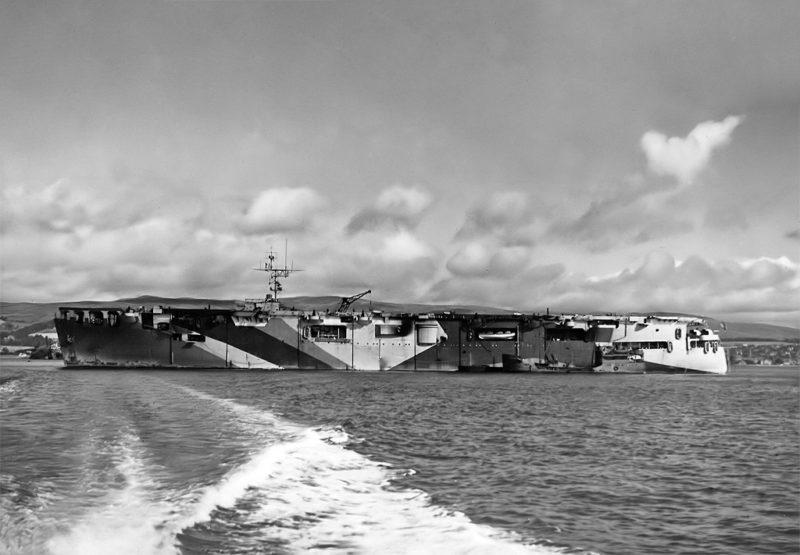
TOURIST CLASS ACCOMMODATION
The Tourist Class public rooms were of a high standard and arranged abaft the engine casing with 81 staterooms on Upper Deck and 69 staterooms on Shade Deck. The latter rooms were abreast the Entrance Hall, while the Lounge and Smoking Room were situated in a deckhouse surrounding the main mast on Shade Deck. Tourist Class Staterooms were normally for two or three person occupancy, with a few of four person occupancy for families. All were furnished with tallboy wardrobes, and chests of drawers and had sprung mattresses complete with bedhead reading lights.
Tourist Class Lounge on Shade Deck was artistically panelled in primavera and peroba veneers with a figured cherry frieze and skirting to give a suitable relaxed feeling.
Tourist Class Smoking Room was very well furnished with walls having a peroba dado and warm biscuit coloured panels above, relieved with veneered panels of figured walnut.
Tourist Class Entrance Hall was arranged to harmonise with the adjacent Tourist Class public rooms with walls having large panels artistically painted in light colours, and with pilasters in walnut with a cherry border.
Tourist Class Promenade Spaces included the sides and aft end of Shade Deck and a large portion of Bridge Deck. The promenade spaces on Boat Deck were arranged for both First Class and Tourist Class passengers, with a particularly pleasant area at the after end of the deck.
Tourist Class Dining Room on Upper Deck sat 330 passengers at the forward end of 81 staterooms, and stairways were provided to the Tourist Class Entrances on both Shade and Bridge Decks. The room was treated with panels of bleached cherry having horizontal dividing strips of a darker shade, while bold panels of zebrano at intervals provided a decorative contrast. Large mirrors and suitable curtains with indirect lighting gave a soft, even light suitable for long, relaxed dinners.
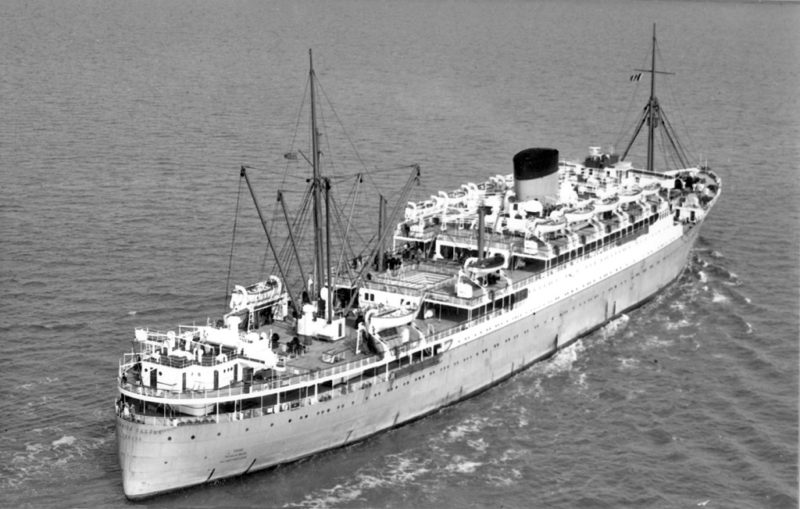
CAREERS OF DURBAN CASTLE and PRETORIA CASTLE/WARWICK CASTLE
Durban Castle inaugurated the practice of naming ships after non-existent South African castles. She was launched on 14th June 1938 and delivered on 15th December, making her maiden voyage on 31st December 1938 under the command of Capt. E.E. Spradbrow on the ‘Westabout’ London to Cape Town route. She called at Walvis Bay, Cape Town, Mossel Bay, Port Elizabeth, East London, Durban, Lourenco Marques, and Beira with return to Cape Town and a call at St. Helena and Ascension Island on the return homeward voyage to London. Pretoria Castle was delivered on 18th April 1939 and was named after the capital and administrative centre of South Africa, and the civic authorities presented a very fine painting of the Union Government Buildings at Pretoria to the ship. She sailed from London on 5th May 1939 to load at Antwerp, Rotterdam and Hamburg to begin her maiden voyage. She served pre-war on the same route in a three-ship service with Durban Castle and Dunnottar Castle. On one voyage only, Durban Castle from Lourenco Marques and Pretoria Castle from Durban extended the route to Port Louis on Mauritius, returning directly to Durban.
Pretoria Castle was requisitioned by the Admiralty and converted into an Armed Merchant Cruiser (AMC) in October 1939 and armed with eight 6-inch guns and two 3-inch guns and was based at Freetown to protect South Atlantic convoys. She was purchased by the Admiralty in July 1942 and sent to Tyneside to be converted into an escort aircraft carrier by Swan, Hunter & Wigham Richardson Ltd. The upper passenger decks were cut off and replaced with a ‘flat top’ with the navigating island on the extreme starboard side of the flight deck.
Pretoria Castle was commissioned in July 1943 and served for the remainder of the war as a trials and training carrier, particularly on the Clyde and did not see active service. She carried fifteen naval aircraft launched by one steam catapult for pilot training purposes. In 1945, she twice became part of naval aviation history, on the first occasion the famous British test pilot Capt. Eric ‘Winkle’ Brown landed a Bell Airacobra Mark 1 plane on her flight deck using a tricycle undercarriage.
This was the first of many such emergency type landings during trials for new deck landing equipment planned for future carriers. The second occasion was when she hosted a series of flights performed in a Sligsby T20 glider aircraft piloted by John Sproude as part of research into air turbulence. On 11th August 1946, while moored on the Clyde, a Gloster Meteor jet aircraft was used for deck landing trials with steam catapults and new types of landing gear to allow naval jet aircraft to take off and land safely during the future very long air supremacy of the aircraft carrier.
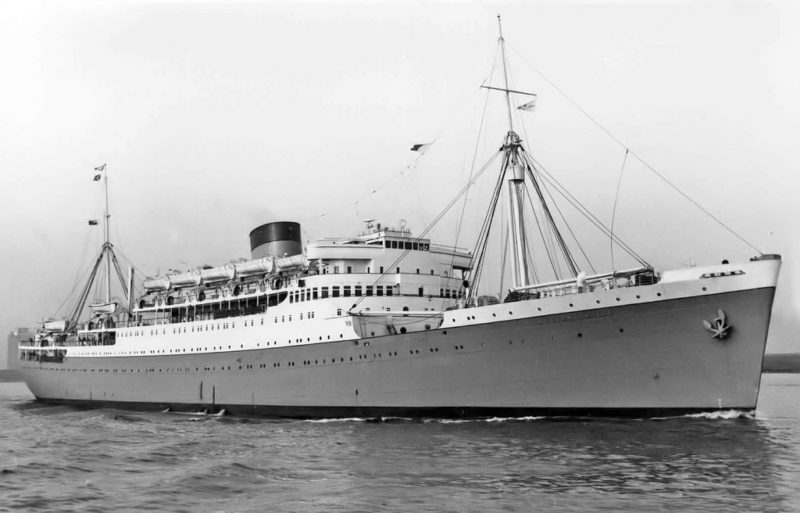
Durban Castle was converted into a troopship in September 1939 and infantry landing ship in 1942, making the first of many important wartime trooping voyages as follows:-
4.9.1939 Sailed Glasgow for Malta and Gibraltar, returning to Plymouth on 29th September for release back to her owners.
5.9.1940 Sailed Glasgow for Liverpool, and Table Bay.
31.12.1940 Sailed Glasgow for Freetown, Cape Town, Suez, Bombay, Cape Town, and Freetown, and voyage repairs on the Clyde on her return.
3.6.1941 Sailed Glasgow for Freetown, Cape Town, Bombay (dry-docked), Colombo, Mombasa, Durban, Cape Town, Trinidad, with voyage repairs at Liverpool on her return.
30.10.1941 Sailed Greenock for Halifax (NS) and returned to the Clyde on 21st November for voyage repairs.
9.12.1941 Sailed Glasgow for Freetown, Bombay, Aden, Suez, Aden, Colombo, Adelaide, Lyttelton, Balboa, Panama Canal, Cristobal, Bermuda with voyage repairs on her return to Liverpool on 10th May 1942.
26.10.1942 Sailed Glasgow for Gibraltar with troops for Operation Torch landings in North Africa.
25.11.1942 Sailed Glasgow for Algiers with troops for Operation Torch landings in North Africa.
24.1.1943 Sailed Glasgow for Algiers with more troops and on her return temporary repairs were made to collision damage as well as voyage repairs. She was then fitted out as an Infantry Landing Ship on the Clyde with landing craft replacing her lifeboats.
4.5.1943 Sailed Glasgow for Algiers, Malta, Oran and Gibraltar returning to Glasgow on 26th July for voyage repairs.

12.8.1943 Sailed Glasgow for Phillipville, Oran, Algiers, Oran, Naples, Augusta, Algiers and returned to Greenock on 5th November for voyage repairs.
15.1.1944 Sailed Greenock for Port Said, Taranto, Port Said, Taranto, Port Said and returned to Liverpool on 16th March for voyage repairs.
29.3.1944 Sailed Greenock for Naples, Bone, Naples, Oran, Naples, Bone, Naples, Algiers, Naples, Oran, Naples, Taranto, Port Said, Taranto, Port Said, Oran, Alexandria, Taranto, Alexandria, Taranto, Alexandria and return to Greenock on 21st October 1944 for engine overhaul and dry-docking to withdraw her tail shafts.
16.12.1944 Sailed Greenock for Port Said, Suez, Aden, Colombo, Aden, Suez, Port Said, Gibraltar and return to Liverpool for repairs.
10.3.1945 Sailed Liverpool for Port Said, Bombay, Suez, Port Said, Gibraltar and return to Liverpool for voyage repairs and repairs to troop accommodation.
23.5.1945 Sailed Liverpool for Port Said, Suez, Colombo, arriving 13th June, Suez, Port Said and return to Southampton for repairs.
1.8.1945 Sailed Southampton for Port Said, Bombay, Cochin, Suez, Port Said and return to Liverpool for dry-docking and engine and voyage repairs.
12.10.1945 Sailed Liverpool for Port Said, Colombo, Port Said, Taranto, Port Said, Suez (sailed 31st December), Aden, Fremantle, Melbourne, Wellington, Singapore, Bombay, Port Said and return to Southampton on 23rd May 1946 for dry-docking.
14.6.1946 Sailed Southampton for Naples, Malta, Alexandria, Malta, Toulon, Alexandria, Malta, Toulon, Alexandria, Toulon, Alexandria, Malta, Toulon, Naples, Port Said, Toulon, Port Said, Piraeus, Toulon, Malta, Alexandria, Port Said, Piraeus, Toulon, Port Said, Piraeus, Port Said, Toulon, Piraeus, Toulon, Port Said, and return to Southampton on 18th November 1946 and release from requisition.
Durban Castle had taken part in the North Africa, Sicily, Salerno, Anzio and South of France landings and carried tens of thousands of troops. After the fall of Greece in 1941, she carried the King of Greece and his staff from Durban to the U.K., after they had fled south from Egypt throughout Africa.
She returned to commercial service in December 1946 still carrying her AA gun platforms forward of the bridge and on the after housing and with nine lifeboats on each side of her hull replacing the landing craft. This austere service ended when she was changed back to her original guise when she was finally re-conditioned.
Pretoria Castle was re-acquired by Union-Castle Line later in 1946 and rebuilt to her original specifications by her builder Harland & Wolff Ltd. at Belfast, but was renamed as Warwick Castle (4), as the name of Pretoria Castle was to be reserved for a new express liner already building on the stocks.
She resumed commercial service on 13th March 1947 to run with her sister on the main mail route to Cape Town, while the larger express liners also completed their post-war refits up to 1950.
The work to return the vessel to a liner was extensive and involved the removal of her topsides, flight deck and hangars, and the rebuilding of the superstructure, and the internal public rooms. The hull was repainted from her ‘dazzle’ war paint scheme into a lavender colour. She returned to service with accommodation for 207 First Class and 335 Tourist Class passengers. The public rooms had meticulously been returned to their pre-war splendour, and their light, airy atmosphere combined coolness with colour schemes of restful simplicity. The staterooms were returned to spacious and well furnished rooms, and a library, shop, hairdressing salon, and children’s playroom and safe open deck space were rebuilt to make this liner into a valuable addition to the Union-Castle Line fleet.
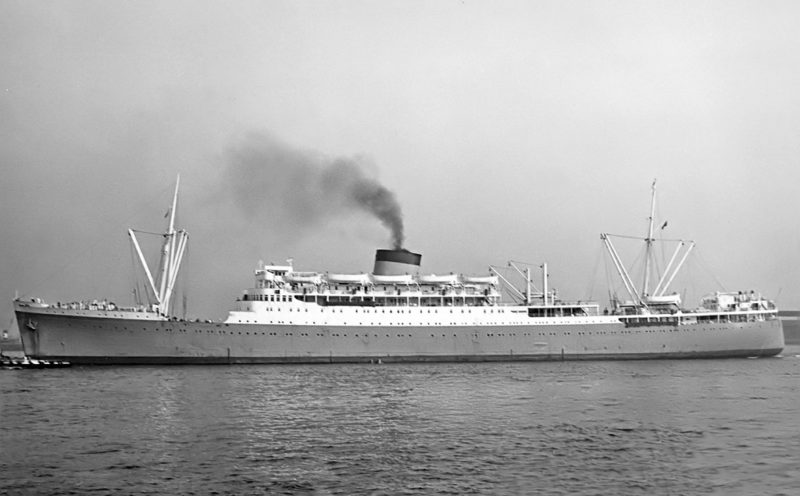
MURDER OF AN ACTRESS
Gay Gibson was a glamorous actress with dreams of making it big in the West End of London, when she sailed from Cape Town on Durban Castle in October 1947 for England. When the ship docked in Southampton it was met by police officers eager to search cabin 126 where Gay had mysteriously disappeared, and to question steward James Camb, suspected of killing the 21 year old and pushing her body out of the porthole into the shark infested Atlantic Ocean. Camb, aged 31 years, was a sexual predator who had attempted to seduce many female passengers.
Gay Gibson, real name Eileen Isabella Ronnie Gibson, was the daughter of an English businessman, and had made a name for herself in South Africa playing the lead in ‘The Man with a Load of Mischief’ opposite former British boxing champion Eric Boon, but was keen for fame and fortune on a larger scale.
When Gay was reported missing, the liner turned around, however a desperate search of the area found no trace of the young woman. Gay was last seen at 0100 hours, leaning against a rail and smoking a cigarette, still wearing the black evening dress and shoes she had worn that evening for dinner. She told the night watchman that it was too hot down below, and she could not sleep. At 0300 hours, the same officer, James Murray, answered a call from her cabin and saw two lights on, indicating she had summoned both the steward and stewardess. Murray tried to enter the cabin but his passage was blocked by Camb, who opened the door slightly and assured everything was fine.
Assuming Camb was answering Gay’s call, Murray left, but his suspicions were aroused the next morning when Gay failed to appear, and he reported the events of the night to the Captain. Camb denied being in Cabin 126 that night, but when examined by the ship’s surgeon, scratches were found on his wrists and shoulders. He claimed these were self-inflicted, saying he had scratched himself that night and rubbed himself with a rough towel. However, when the police interviewed him in Southampton, he changed his story, claiming he and Gay had consensual sex, but that she had suffered a sudden fit and died. When he could not revive her, he panicked and pushed her lifeless body through the porthole.
Camb was charged with Gay’s murder and his trial began on 10th March 1948 before Mr. Justice Hilbury. An array of exhibits lay in front of the jury including a replica of Cabin 126, and cabin linen smeared with blood and saliva from Gay. Camb took the witness box but could not explain why he had not summoned help and why he had disposed of the body. The solicitor for his defence was aghast when he admitted under cross examination from the prosecuting barrister that he had changed his story six times. However, it was one final piece of evidenced that sealed Camb’s fate, when Dr. Frederick Hocking discovered dried urine on the bed linen, and explained to the court that it was common for the bladder to discharge itself during strangulation.
Camb was quickly found guilty and was sentenced to hang, but he cheated the gallows as a No-Hanging Bill was being discussed by Parliament and his sentence was commuted to life imprisonment. He was released in September 1959 and worked as a waiter for several years until he was arrested for further sexual offences and was sent back to prison for the remainder of his original sentence, and he died in 1979 aged 63 years. A book entitled ‘The Porthole Murder Case’ was later written by Denis Herbstein and published in soft back.
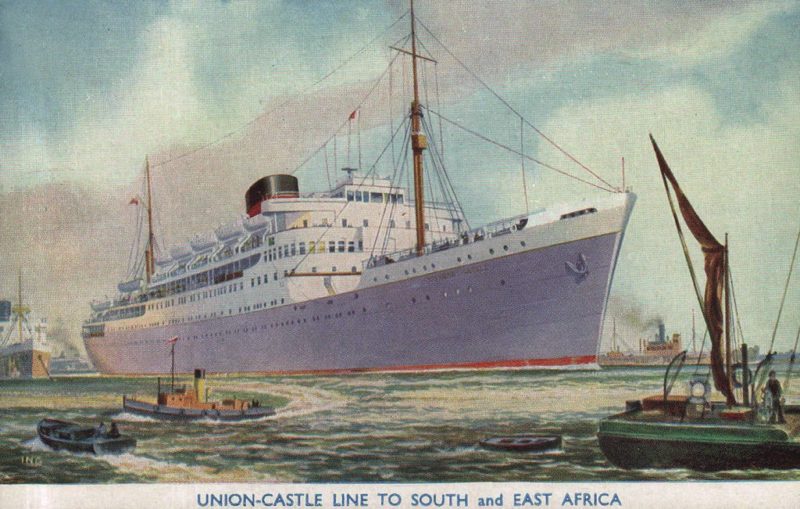
EASTABOUT and WESTABOUT SERVICES from 1950 until 1962
When one of the pair of sisters sailed on the Eastabout service around Africa to Cape Town, the other sister sailed on the Westabout service around Africa to Cape Town, their four partners on the three-ship service being the newer Braemar Castle, Rhodesia Castle and Kenya Castle as well as the older Dunnottar Castle. After a few years on one of these two routes, the sisters interchanged Eastabout and Westabout service. The ports of call on these routes were as follows:-
WESTABOUT EASTABOUT
London London
Las Palmas Gibraltar
Ascension Island Marseille
(every other voyage) Genoa
St. Helena Port Said
(every other voyage) Suez
Cape Town Port Sudan
Port Elizabeth Aden
East London Mombasa
Durban Tanga
Lourenco Marques Zanzibar
Beira Dar-es-Salaam
Dar-es-Salaam Beira
Zanzibar Lourenco Marques
Tanga Durban
Mombasa East London
Aden Port Elizabeth
Port Sudan Cape Town
Suez St. Helena
Port Said (every other voyage)
Genoa Ascension Island
Marseille (every other voyage)
Gibraltar Las Palmas
London London
Durban Castle arrived at London for the last time on 28th March 1962 at the end of a 24 year career cut short by political changes in East Africa, and serious cost increases in crew costs and fuel costs.
She arrived in the following month at Hamburg to be broken up by Eisen & Metall Gmbh. Warwick Castle arrived at Barcelona on 26th July 1962 to be scrapped at a yard which lay directly under the high ‘Transbordador’ cable car system that carried residents and workers from one side of the harbour to the other.
The newer Braemar Castle, Kenya Castle and Rhodesia Castle then operated a passenger and cargo service between London and Durban via East Africa and Portuguese East Africa, apart from one or two ‘Round Africa’ voyages each year during the December to February period.
During the rest of the year, passengers continued to be able to travel ‘Round Africa’ by transferring at Durban to or from the larger liners operating on the express South African Mail Service.
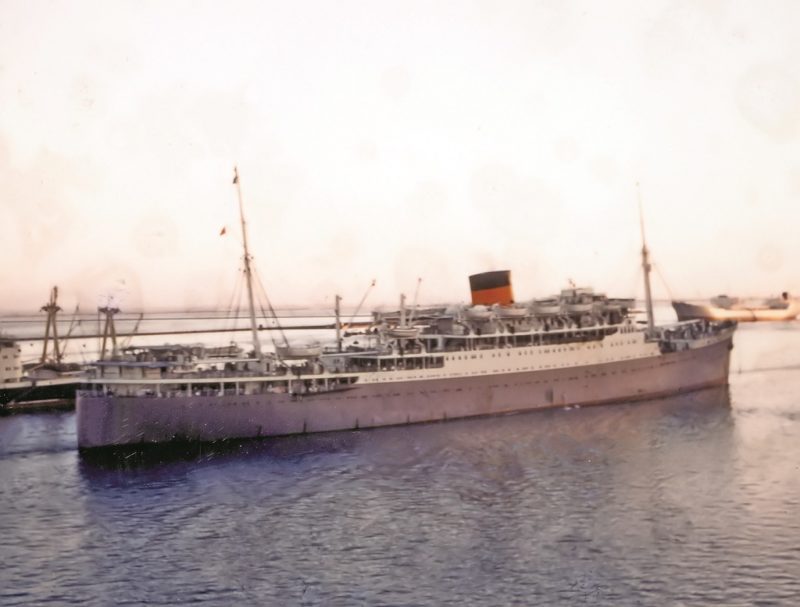
SUMMARY
The popularity of both Durban Castle and Pretoria Castle, the latter renamed Warwick Castle (4) in 1946, was undiminished on the 22 port call ‘Round Africa’ service, either eastabout or westabout, until political changes in East Africa brought its demise.
The first Warwick Castle was a three masted sailing ship of 1,181 grt built on the Clyde in 1863 for the Liverpool to Calcutta service of Castle Line. The second Warwick Castle was a steamer of 2,957 grt built on the Clyde in 1877 with accommodation for one hundred First Class passengers, fifty in Second Class, and one hundred in ‘emigrant’ class, basically steerage accommodation. The third Warwick Castle was a twin funnelled liner of 20,445 grt completed by Harland & Wolff Ltd. at Belfast in 1931 with accommodation for 500 passengers with a crew of 350, and torpedoed and sunk on 12th November 1942 during the North African landings of Operation Torch
The impressive Long Gallery in the First Class accommodation connecting the forward public rooms with the Smoking Room aft was very popular with passengers as it had many high quality mahogany tables with metal banding around their tops, and very comfortable sofa chairs covered in multi-coloured fabrics and patterns.
In a fleet renowned for many very beautiful liners, this Union-Castle Line ‘Round Africa’ pair were given just enough sheer in their hull lines by the naval architect to make them graceful as well as very handsome. As with all of the great liners of this great shipping company, they sailed from port with their orchestras playing the National Anthem, which could also be heard from those on shore.

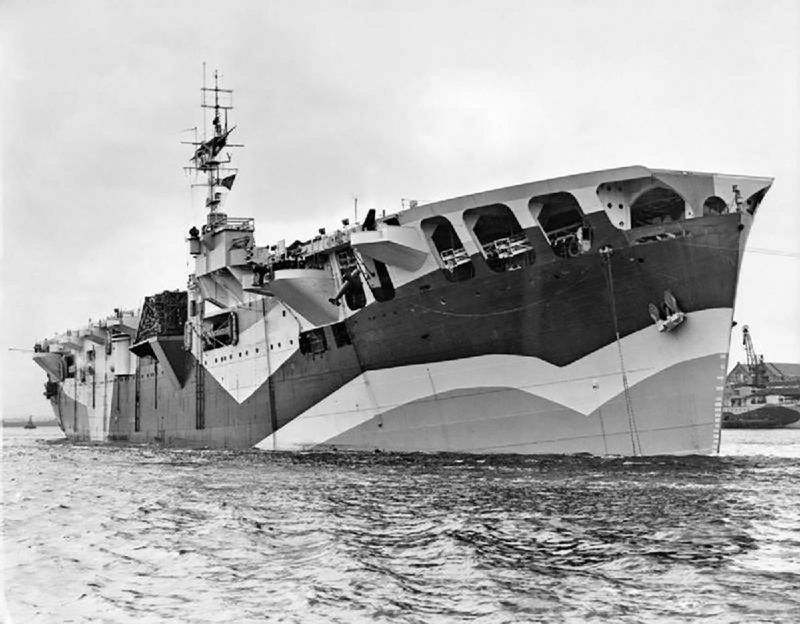
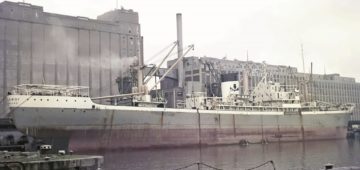



Comments
Sorry, comments are closed for this item